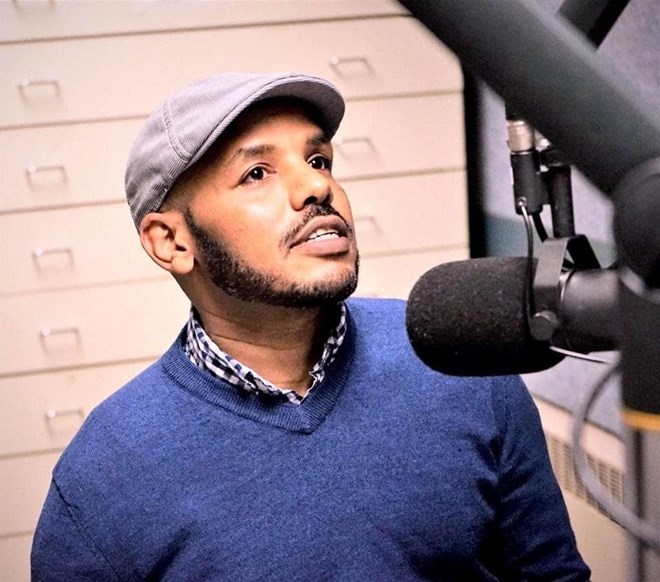
Sunday May 24, 2020
Kirsti Marohn

Hani Jacobson is a registered nurse and community health specialist for CentraCare Health. She's also a member of the Somali language COVID-19 task force in St. Cloud, Minn.Courtesy of Ahmed Abdi | Somali Community Radio
As the number of COVID-19 cases in the St. Cloud area continues to climb, an effort is underway to reach connect the region’s Somali American community with information and assistance.
Much of that effort has focused on community members who don’t read English or Somali, whose oral tradition relies on information mainly spread through word of mouth. For them, accessing public health information about the coronavirus on printed flyers or websites can be a challenge.
That’s who Abdirahim Osman and Karsten Potts are hoping to reach. They’re Somali language interpreters in St. Cloud, Minn., and started a consulting company that’s now producing public service audio clips about the coronavirus.
The clips are designed to share information from the U.S. Centers for Disease Control and Prevention and the Minnesota Department of Health in short segments that can be easily shared via social media or text."A lot of people do not read the language that they speak to their parents,” said Potts, a substitute teacher who’s spent time in East Africa.
The written Somali language wasn't adopted until the 1970s, not long before Somalia was torn apart by civil war. Potts said some people who fled the country didn’t learn it in Somalia or refugee camps before coming to the United States, and it's not taught here in schools. For them, even written materials translated into Somali aren’t very helpful.
“So, we realized a lot of people were not using this reference information," he said.
That raises significant concern because COVID-19 has struck St. Cloud's Somali American community hard. There have been outbreaks at two poultry processing plants in nearby Cold Spring and Melrose, Minn., and many workers at those plants are Somali American.
As of Friday, Stearns County had 1,881 confirmed cases of COVID-19, the third-highest number of any Minnesota county.
According to May 19 data from the Minnesota Department of Health, more than half of Stearns County’s positive cases, where the race of the person was known, were black. That compares to 30 percent statewide.
Person-to-person contact
In the early days of the outbreak, a community task force formed to help the Somali American community cope with the COVID-19 crisis. One of the members is Hani Jacobson, a registered nurse and community health specialist for CentraCare Health, the region's main health care provider.
When the outbreak first started, their goal was to educate people about the virus and how it spreads, Jacobson said. They focused on people who didn't know how to use the internet or read in either English or Somali.
"It's easy to print out flyers and direct people to the CDC and [Minnesota Department of Health’s] website,” she said. “But for those people, those avenues don't work."
Jacobson started calling community members on the phone. She drove around to Somali-owned businesses and talked to people directly. She did interviews on a local Somali language radio station.
"Really, the best way to reach out to this particular community that we were trying to reach is voices,” she said.
Now that the disease has taken hold in the community, the focus has shifted to helping families affected by COVID-19 with whatever they need, including food, medication and information about how to treat the disease, Jacobson said.
“We try to meet their needs to decrease their need to leave the house,” she said.
But there are barriers that make it challenging. Jacobson said for larger families that live together in apartments with limited space, it’s difficult to isolate someone who’s sick.
And Jacobson said many Somali Americans in her community are still working in essential jobs, which increases their risk of being exposed to the coronavirus. She tries to help workers understand their rights, and urges them to stay home if they are sick.
But the economic impact of COVID-19 is taking a toll on the community.
Task force member Sahur Hussein is a career planner with Career Solutions, a St. Cloud employment agency. Lately, she's been helping people apply for unemployment.
"A lot of families are questioning, ‘What do we do if we're sick? What do we do if a family member is sick?’” Hussein said. “[There are] a lot of questions regarding, ‘’How do we pay for our bills if we can't work?’”
Trauma repeated
The uncertainty is especially difficult for a community all too familiar with tragedy and upheaval.
The pandemic is especially tough for those who live alone, or have a history of trauma, said task force member Kahin Adam, a community health specialist with CentraCare who specializes in mental health.

Kahin Adam is a community health specialist for CentraCare Health. He's a member of a task force trying to spread information about COVID-19 to the Somali community in St. Cloud. Courtesy of Ahmed Abdi | Somali Community Radio
"Many of them have a fear of losing their income, fear of becoming homeless, fear of starvation — because it is something that they experienced, either in a refugee camp or in the war,” Adam said.Isolation has been particularly difficult during the Muslim holy month of Ramadan, usually a time of celebration and family gatherings, he said.
Adam is reaching out to community members, to offer advice and ask if they need help or a referral to a therapist. He said people seem to really appreciate the personal outreach.
"Some of them get emotional,” he said. “Some of them say, ‘This really made my day, and I'm so happy that you called me and you are trying to help me because I have been sitting here so confused and feeling helpless. And now calling me gives me hope.’"